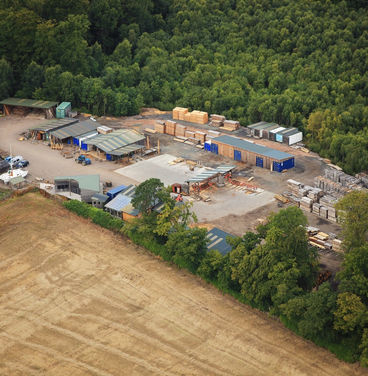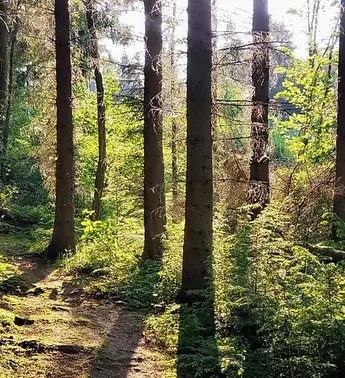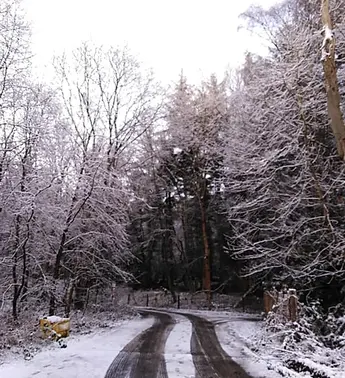The story of Scottish Wood
Scottish Wood was founded by Jim Birley with his late wife Maggie, 20 years ago now - an accidental Sawmill without a Saw. After buying land surrounded by 55 acres of Woodlands and felling an area of dying Oaks to build their home on, they soon discovered there was no local demand for a small amount of logs.
The decline of heavy industry in Scotland saw a dramatic decrease in demand for Scottish hardwoods. This was aggravated by the increase in popularity of flat-pack furniture industry causing the market for Scottish hardwoods to dwindle to almost nothing. This drop in demand for home-grown hardwoods meant that farmers and landowners saw little to no return from their broadleaved woodlands and so woodland care, husbandry and replanting also declined.
By the 1990's around 95% of Scotland's hardwoods were wasted or under-utilised , with only the best timbers recovered and sold. Local markets and hardwood Sawmilling facilities were largely gone and so these timbers were exported as low value logs, with all the beneficial value-added processing happening elsewhere. Meanwhile Scotland was importing over £100 million worth of hardwoods and hardwood products every year.
This was the climate into which Scottish Wood was born.
With this knowledge and their passion and hope to revitalise the local woodland culture, coupled with the inspiration from their time working and living in El Salvador, witnessing refugees returning to their country after years or civil war and setting up community based social enterprises on land previously owned by the wealthy in order to serve their new communities, Maggie decided it was an effective model that could be applied just as well at home in Scotland and lead to the creation of a social enterprise, to provide employment and ensure funds raised were reinvested back into local community projects. For this, they recruited like-minded individuals from the local community, neighbours, forest consultants, woodworkers and community activists and set up Dynamic Woods, a Scottish charity that brings together local communities, environmentalists, landowners and local businesses to promote the sustainable development of our woodland resources and from this the trading arm Scottish Wood was created. Small at first cutting and processing local timber to sell, hiring a mobile saw when needed.
As this progressed and stock levels increased, Scottish Wood grew bigger than ever imagined. Profits grew and were given back as grants to local community groups, Active schools was set up to develop a Forest school programme in West Fife. New employees were taken on through new deal trainee programmes, saws were bought to keep up with demand and a showroom was open so that everyone had access to the beautiful Scottish hardwoods, even if you only had a couple of pounds to spend. Over the years since starting with just a kiln and a chainsaw, with a lot of hard work and determination Scottish wood has grown into a thriving business supplying timber from environmentally sustainable sources in Scotland, usually within a 50 mile radius of where the Sawmill is based in Fife, open to trade and public 4 days a week, with 7 full time staff, Woodmizer saws with production line set up, planers and thicknesser, firewood splitter, kindler, onsite biomass boiler and 2 kilns, 23 timber stores and a new and improved Timber shop, mixed stock shed and Larch stores, all to deliver you the finest quality Scottish hardwoods while demonstrating the viability of using locally grown to benefit local woodlands and communities.
Scottish Wood has been dedicated to encouraging collaboration within the hardwood and forestry sectors. It is environmentally aware and socially conscious organisation.
Scottish wood was awarded Dunfermline and West Fife Responsible Business Champion in 2017.
Dynamic Woods
Revitalising the local woodland culture
Dynamic Woods adopts a holistic approach to our local woodlands encompassing community, economic and environmental issues. We draw on the expertise of, and build partnerships between all interested parties to develop sustainable ways forward for our local woodlands: breathing life into our woodland heritage and ensuring the future of this beautiful resource for many more generations.
Combating a history of neglect
We have inherited a neglected woodland culture. Whilst we import over £100 million worth of hardwoods each year, our own broadleaf woodlands lie neglected, wood considered worthless or even waste. Some of these trees that have graced our landscapes for generations even end up in landfill sites when they could be contributing to the local economy; providing training and work opportunities as well as improving the environment and providing local amenities. The future of our woodlands depends on all interested parties coming together to develop a sustainable way forward. Dynamic Woods helps forge working partnerships between landowners, communities, businesses and environmentalists. It also offers training, cooperative marketing, wood-processing services, incubation space for new indigenous businesses and environmental restoration work.
Scottish Wood is the trading arm of Dynamic Woods and profits raised through the sale of our Timber goes directly to supporting these projects, being split between reinvestment in the yard, to help develop the small sawmill sector, support local community activities, and organisations with an interest in woodland and timber. Funds are targeted very locally in West Fife former mining villages and areas of deprivation. For example, the set up and support of Forest Schools through Active Schools Fife, allowing local schools to access training grants so they can be self-sufficient, support is also given to national-scale groups that are working to revitalise the woodland culture, such as the Scottish Working Wood Label and the Forest Policy Group, and sponsor prizes to encourage students use local timber.
You can read more about how Dynamic Woods was established here.




























